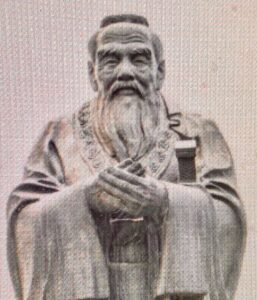 Recently, as I was browsing through my bookshelves, I came across a little book I had bought in Singapore in the 1980s titled A Gentleman’s Code: According to Confucius, Mencius and Others.* Confucius was born over five hundred years before Christ; Mencius, a disciple of Confucius, was born a couple of centuries later. As I browsed through the book’s dog-eared, annotated pages, I was once again impressed with the wisdom of those ancient thinkers and the compatibility of their message with my Christian beliefs.
Recently, as I was browsing through my bookshelves, I came across a little book I had bought in Singapore in the 1980s titled A Gentleman’s Code: According to Confucius, Mencius and Others.* Confucius was born over five hundred years before Christ; Mencius, a disciple of Confucius, was born a couple of centuries later. As I browsed through the book’s dog-eared, annotated pages, I was once again impressed with the wisdom of those ancient thinkers and the compatibility of their message with my Christian beliefs.
Following are a number of passages from their writings. I have listed the examples from each author separately using the same three subject groupings. My comments follow the passages
CONFUCIUS
Self-Improvement
A gentleman* daily examines his personal conduct on three points: In carrying out the duties entrusted to him by others, has he failed in conscientiousness? In dealing with his friends, has he failed in sincerity and faithfulness? In all his dealings, has he failed to pass on whatever he has learned which may assist others?
He who wishes to live a good life must first be conscious of any faults within himself. Only after struggling to overcome these faults will he attain goodness.
A gentleman tries to banish from his bearing all traces of violence and arrogance, to remove from his actions all insincerity, to purge from his speech all vulgarity and impropriety.
What should one do to improve one’s character, correct one’s personal faults and dispel the delusions of life? First, make it a rule not to accept any reward unless you have worked hard to earn it. That is the best way to honor and virtue. Secondly, vanquish your own vices and failings before condemning those of others. That is the best way to remove the secret vices of the innermost mind. And thirdly, do not let sudden anger endanger your safety or that of your loved ones.
A man is ailing if he makes no progress in virtue, learns nothing new, abandons no bad habits and corrects no mistakes.
There are nine things of which a man should be mindful: to see clearly when he uses his eyes, to hear distinctly when he uses his ears, to be gracious in expression, to be respectful in demeanor, to be sincere in speech, to be serious in the execution of his duties, to seek advice when in doubt, to consider the consequences when he is angry, and to think of what is right and just when he is faced with advantage or gain.
Habits of Living Well
Likes and dislikes should not affect our judgment. We should be on the side of what is right and against what is wrong.
A gentleman sets strict standards for himself, but makes allowances for others.
When a gentleman makes a mistake, he never tries to gloss over it or whitewash his wrong-doing.
A gentleman has a sense of shame, a sense of courtesy and a sense of right and wrong in the manner he conducts himself.
A gentleman is ashamed to let his words outrun his deeds.
There are four things a man of superior mind eschews: he takes nothing for granted, he is never over-positive, he is never inflexible and he is never egotistic.
It is moral cowardice to be faced with what is right and leave it undone.
Prayer is not confined to the moments spent in a temple but expresses itself in every thought, word and action.
One should begin by defining all things accurately. If a thing is not correctly defined, what is said will not correspond with the facts. When words do not correspond with facts, affairs will not culminate in success. When affairs do not succeed, order and harmony cannot flourish, law and justice will not fit the crime. When law and justice do not fit the crime, mankind is in confusion.
Treatment of Others
If a son merely ensures that his parents have enough to eat and there is no deep feeling of love and respect towards them, wherein lies the difference between his relationship with them and his relationship with his domestic animals?
The four essential virtues of a leader are that in his personal conduct he is respectful; in his dealings with his inferiors he is considerate; in caring for the welfare of the common people he is generously kind; and in dealing with all, he is just.
Is not he a gentleman who repays injury with kindness, and kindness with kindness?
MENCIUS
Self-Improvement
If a man build[s] up the nobler part of his nature, then the baser part cannot overcome it.
Rectify the mistakes in others by first rectifying them in yourself.
The feeling of compassion is the beginning of benevolence; the feeling of shame and self-reproach, the beginning of righteousness; the feeling of courtesy and modesty, the beginning of propriety; the feeling of right and wrong, the beginning of wisdom. These four beginnings are like the four limbs of man and to deny oneself any of these potentialities is to cripple oneself.
If others do not respond to your love with love, look into your own heart; if others fail to respond to your attempts to teach and lead them, look into your own wisdom; if others do not return your courtesy, look into your own motives. In all cases, examine yourself whenever you fail to achieve your purpose.
Habits for Living Well
A man has to live with himself; so he should see to it that he is always good company.
When our senses are exercised without thought and are thereby obscured by material things, we are led astray. Heaven gave us mind and senses. Guided by thought, let us use our senses in the right way.
When his chickens and dogs stray, a man has sense enough to go after them. Should he therefore not be even more diligent in pursuit if his heart strays from the path of truth and goodness?
To act without clear understanding, to form habits without examining them, to pursue the Way all his life without knowing where it leads—this is the way of the ignorant man.
Treatment of Others
It is not enough to look after one’s parents when they are living; it is important to honor and respect them even after they are dead.
To shame one’s personal name is bad enough, but to shame one’s surname is unforgivable because a surname is shared with others.
My Comments on the Quotations
One striking feature of these statements by Confucius and Mencius is that the terms and concepts they value as essential are ones that we have largely abandoned. Notable examples are benevolence, righteousness, propriety, respect, virtue, honor, truth (not my truth or your truth but the truth), goodness, graciousness, courtesy, shame (in the positive sense), prayer, standards, considerateness, generosity, kindness, mistakes and faults (our own, obligation (our own), and gentleman.
Equally striking is the contrast between their view of self and the view that has become dominant in our culture. Whereas our focus is on loving and esteeming ourselves and refusing to criticize ourselves or accept criticism from others, their focus is the exact opposite—identifying and overcoming our faults and avoiding arrogance and egotism.
Equally striking is the sharp contrast between their view of self and the view that has become dominant in our culture. Our culture advises us to love and esteem ourselves, avoid self-criticism and reject criticism from others. They, in contrast, advise us to identify and overcome our faults and avoid arrogance and egotism.
In fact, Confucius regards overcoming our own faults as the very first step in attaining goodness and leading a good life. He further advises us to be stricter with ourselves than we are with others. Similarly, Mencius urges overcoming our own mistakes before concerning ourselves with the mistakes of others.
What might be the result if we set aside today’s fashionable self-adulation and pursued the code recommended by Confucius and Mencius? I believe we would go a long way toward replacing our current division with harmony and ending much of the unrest, hatred, and violence that plague our country. How would this happen? Confucius offered this simple explanation—By improving ourselves we indirectly improve our families, our country, “and ultimately the world.”
[* Note: The use of “gentleman,” “man,” “he,” “him,” etc. is in the original, written more than 2.5 millennia before female references were used. Whether or not the authors intended that use to be inclusive of women, the present author intends it to be.]
Copyright © 2022 by Vincent Ryan Ruggiero. All rights reserved


